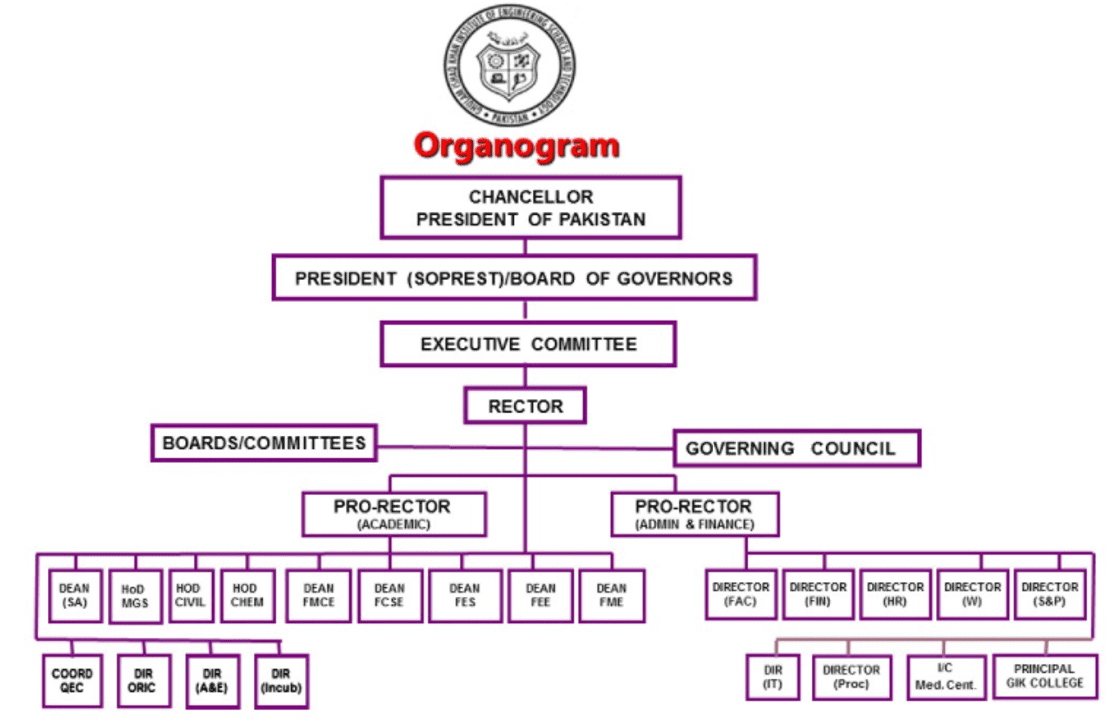Overview
The Ghulam Ishaq Khan Institute of Engineering Sciences and Technology, one of the most prestigious engineering institutes in Pakistan, seeks to promote excellence in engineering, sciences, emerging technologies, and other disciplines and to serve as a center of change in the country. GIK has set the standard for brilliance in Pakistani engineering by producing graduates who are working and making an impact in some of the most sought-after national and international organizations. Autonomous and privately funded, GIK prides itself on attracting and retaining outstanding faculty who are recognized as leaders in their fields. It hopes to produce graduates who distinguish themselves through their professional competence, humanistic outlook, ethical rectitude, pragmatic approach to problem-solving, organizational and managerial skills. The Institute aims to build a culture based on interdisciplinary research, learning with real-life application, and technical competence for the advancement of Pakistan’s economic development.
GIK offers more than just academic excellence- there are a variety of extracurricular activities that let students explore their interests in science, art, and culture, as well as develop leadership skills. Currently, over 24 student societies are active on campus, each with their own goals and objectives. Many of these societies hold events such as contests, workshops, drama performances, excursions, and publish newsletters.
How It Began
The genesis of the Institute can be traced back to the early 50’s when Mr. Ghulam Ishaq Khan (late) became acutely aware of Pakistan’s dependence on foreign expertise and imported technology. Out of his frequent interaction with the foreign and local experts emerged the idea that a center of excellence in engineering sciences and production technology ought to be established in the country, a center whose standards of education are comparable to those of its counterparts in the advanced countries. The transformation of this idea into a practical proposition took place in December 1985 when the Benevolent Community Care and Infaq Foundation donated Rs. 50 million for setting up an institute in the Khyber Pakhtunkhwa for promotion of science and technology.

A milestone in the evolution of the Institute was the registration in June, 1988 of its parent body, namely, Society for the Promotion of Engineering Sciences and Technology in Pakistan (SOPREST). Mr. Ghulam Ishaq Khan (late), then the President of the country, was elected the President of the Society for life and Mr. H. U. Beg was appointed its honorary Executive Director and Mr. Samiullah Marwat the first fulltime Secretary.
The task of conceiving and formulating the basic form and features of the Institute was entrusted to a group of eminent scientists and engineers. These professionals started transformation of the dream into reality at a galloping pace. The civil works at the campus site were started in early 1990. An interim office of the Institute was set up in August 1992 where senior professionals with outstanding backgrounds worked in a cohesive group to evolve the educational aims and philosophy of the Institute, its curricula and details of state-of-the-art equipment for its laboratories and workshops. The ordinance of the Institute was promulgated by the Frontier Government in March 1993 and the first batch of students entered its portals in October 1993.
The Institute symbolizes the immense altruism and concern for collective welfare that exists in the private sector. It is the first privately-funded institute of its kind in the country and dedicated to bringing our engineering education at par with the advanced countries. The tuition fee has to be in consonance with the high cost of education. However, what the students are charged hardly covers the annual expenditure. Total capital outlay of the Institute to-date on historical cost basis works out to more than Rs. 2.5 billion for which funds were mobilized from diverse sources including a major donation of Rs. 750 million from Infaq Foundation and land measuring 216 acres donated by the Government of Khyber Pakhtunkhwa.


